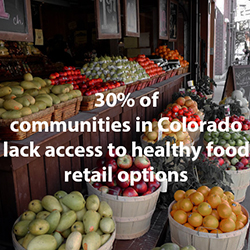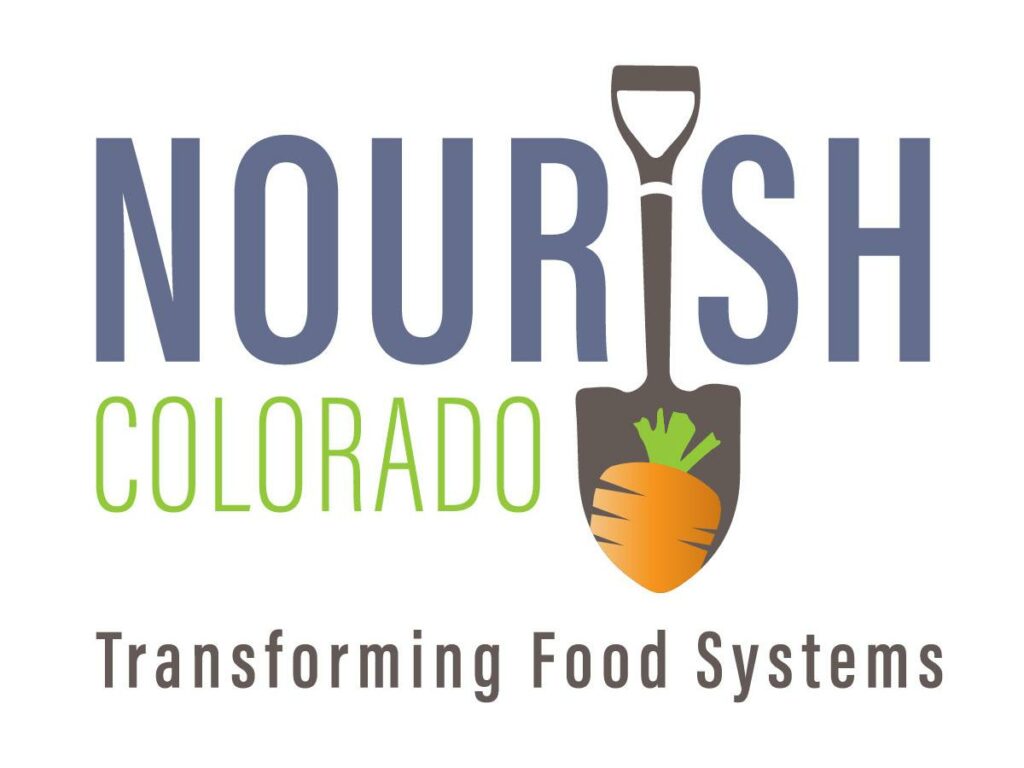By Karen Moldovan, Director of Policy, LiveWell Colorado
 This post was adapted from guest columns published in the Montrose Daily Press on April 15, 2016, and in The Pueblo Chieftain on April 23, 2016.
This post was adapted from guest columns published in the Montrose Daily Press on April 15, 2016, and in The Pueblo Chieftain on April 23, 2016.
At first glance, hunger and obesity not only seem disconnected from one another, but may even appear to be opposing conditions; however, you might find the data surprising. In reality, hunger and obesity may not only co-exist in the same household, but both can stem from the same preconditions: low income, high levels of stress, poor access to health care, cycles of food deprivation or restriction and lack of access to healthy, affordable food.
In Colorado, only 1 in 10 children get the recommended servings of fruits and vegetables each day. According to the Colorado census, 30 percent of communities in Colorado lack access to healthy food retail options. The combination of tight budgets and hungry mouths to feed – along with a lack of time, transportation and nearby grocery options – can often result in the purchase of foods high in calories and low in nutrition.
 Participation in food stamps, federally known as the Supplemental Nutrition Assistance Program (SNAP), can improve dietary intake, reduce food insecurity and play an important role in reducing obesity – yet Colorado currently ranks 46th in the nation in food stamps participation rates among the families who qualify. The Hunger Free Food Stamps Report found that 60 percent of those eligible are enrolled in food stamps in Montrose County, lower than the national average. When families aren’t enrolled in or able to access this food assistance program, our most vulnerable populations suffer. Babies born to food-insecure mothers are more likely to be born pre-term and suffer long-term health consequences. Food insecure Colorado kids are twice as likely to be overweight or obese compared to kids who are food secure, and that means they are also at a much higher risk for serious health conditions like type 2 diabetes, cancer and heart disease. Poverty, hunger, obesity and its related chronic diseases are also disproportionally intertwined in the lives of Colorado’s African American, Latino, and Native American children.
Participation in food stamps, federally known as the Supplemental Nutrition Assistance Program (SNAP), can improve dietary intake, reduce food insecurity and play an important role in reducing obesity – yet Colorado currently ranks 46th in the nation in food stamps participation rates among the families who qualify. The Hunger Free Food Stamps Report found that 60 percent of those eligible are enrolled in food stamps in Montrose County, lower than the national average. When families aren’t enrolled in or able to access this food assistance program, our most vulnerable populations suffer. Babies born to food-insecure mothers are more likely to be born pre-term and suffer long-term health consequences. Food insecure Colorado kids are twice as likely to be overweight or obese compared to kids who are food secure, and that means they are also at a much higher risk for serious health conditions like type 2 diabetes, cancer and heart disease. Poverty, hunger, obesity and its related chronic diseases are also disproportionally intertwined in the lives of Colorado’s African American, Latino, and Native American children.
At LiveWell Colorado, we are working on efforts to increase opportunities to use food stamps for the purchase of nutritious food. The affordability and accessibility of healthy food can be enhanced when food stamps are promoted and accepted at retailers that offer fresh produce as well as opportunities to connect directly with farmers such as farmers markets, produce stands and flea markets.
 One pioneering example is the Montrose and Olathe Local Farmacy Rx program, which is designed to provide assistance and education to families who may be at risk of developing diet-related diseases. This program fosters partnerships between nutrition educators, community food producers and health care providers and increases the consumption of local produce by coupling weekly stipends with budget-friendly family cooking and nutrition classes. Last year, the program brought in over $14,000 of revenue for local farms and resulted in a 77.2% increase in families eating more servings of fruits and vegetables.
One pioneering example is the Montrose and Olathe Local Farmacy Rx program, which is designed to provide assistance and education to families who may be at risk of developing diet-related diseases. This program fosters partnerships between nutrition educators, community food producers and health care providers and increases the consumption of local produce by coupling weekly stipends with budget-friendly family cooking and nutrition classes. Last year, the program brought in over $14,000 of revenue for local farms and resulted in a 77.2% increase in families eating more servings of fruits and vegetables.
We are committed to increasing access to healthy, affordable foods in underserved communities at LiveWell Colorado. This approach, coupled with our partnership at Hunger Free Colorado, will help us reduce both hunger and obesity in Colorado. While these issues are two sides of the same coin, we must address them together if we are going to help improve the health and wellness of our state’s children and families.
ABOUT LiveWell Colorado
Karen Moldovan is the Director of Policy for LiveWell Colorado, a statewide organization committed to reducing obesity and other chronic health conditions by promoting healthy eating and active living. LiveWell reaches more than one million Coloradans through partnerships with communities, the private sector, local governments and school districts. In addition to educating and inspiring people to make healthy choices, LiveWell Colorado focuses on policy, environmental and lifestyle changes that remove barriers and increase access to healthy behaviors. Learn more at www.livewellcolorado.org.

